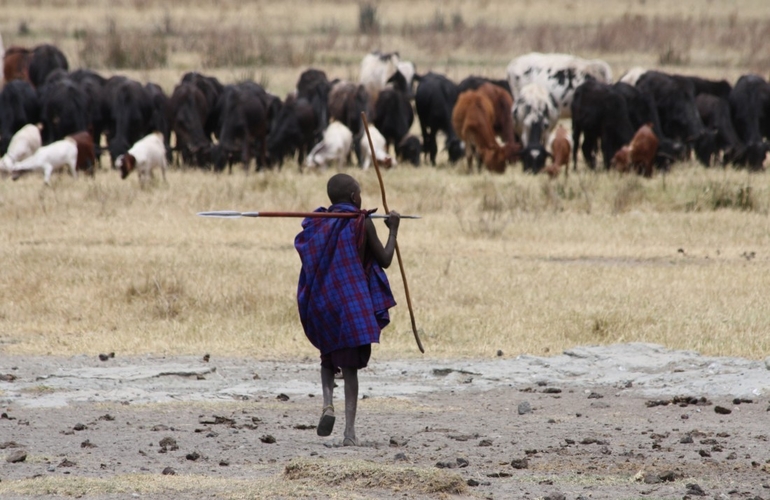At the end of March, Tanzania’s ministry of tourism announced that it will set aside 1,500 square kilometers bordering the Serengeti national park as a “wildlife corridor,” or an area of habitat connecting wildlife populations that would otherwise be completely cut off from each other by human activity. While wildlife corridors—usually meant to help offset the negative effects of inbreeding and reduced genetic diversity—can have positive benefits for wildlife, in this case the corridor will prevent over 30,000 Maasai people from getting to pasture land within it, thus destroying their traditional nomadic cattle-herding lifestyle. The corridor, however, will be left open to the Ortello Business Corporation (OBC) of United Arab Emirates, a Dubai-based luxury hunting and safari company.
More than 90% of the Maasai living in the Loliondo district, where the proposed corridor will be, rely on cattle and goat herding for food. Cattle are an essential part of Maasai culture and diet, with cattle milk serving as the single most important food source.

Photo by www.firstpeoples.org
The Maasai have been herding cattle since pre-colonial times, following seasonal rains across what is now northern Tanzania and southern Kenya. The land that is being proposed for the corridor is particularly crucial because it is the only location where Maasai cattle can graze during the dry season grazing, whey they would otherwise die. The Tanzanian government, however, appears determined to make the corridor a reality. Khamis Kagasheki, the minister for natural resources and tourism, stated “There is no government in the world that can just let an area so important to conservation to be wasted away by overgrazing.” Samwel Nangiria, a government programme manager for a group of local NGOs, has alternatively argued that Maasai culture forbids the consumption of wild game and that their nomadic cattle-herding lifestyle, which is hundreds of years old, poses no particular harm to wildlife. Many academics, such as Benjamin Gardner of the University of Washington, who has studied Maasai land issues for two decades, have also questioned whether it is Maasai grazing or OBC hunting that does more damage to wildlife.
The case of the proposed corridor, as well as the differing responses to it, is a particularly ugly example of the current struggles over food sovereignty, i.e. the rights of different peoples to define their own food systems. The Maasai have been battling with this issue since 1959, when the colonial British evicted the tribe from the Serengeti. Since then, the Maasai have been slowly squeezed into smaller and smaller tracts of land. The proposed corridor would be a particularly devastating blow to Maasai herding, as it will reduce Tanzanian Maasai land by nearly 40%. This major reduction in land access is also coming at a time when climate change, which is causing the rainy season to start later, is placing the tribe’s lifestyle under pressure.
OBC, however, which will be able to exploit the corridor in the Maasai’s stead, has since 1992 flown in wealthy, top-profile clients such as Prince Andrew and the United Arab Emirates royal family clients to shoot lions and leopards. None of their wealth, however, has filtered down to the Maasai. The OBC also has a history of clashing violently with the Maasai; during a drought in 2009, violence erupted between Maasai and national police when the government tried to force evictions and to block herders from a vital water source meters away from the company’s hunting ground, apparently to allow the OBC to hunt. The Maasai say that more than half their cattle died as a result. During this time Maasai homes were also burned and people were beaten and arrested. There was another governmental attempt to evict Maasai from Loliondo last year, but it ceased due to a global outcry back by the advocacy group Avaaz. The threat of violence over the right to the land and animal lives, however, could very well reach a crisis point soon. As Daniel Ngoitiko, a Maasai politician, put it, “My people’s livelihood depends on livestock totally. We would die if we don’t have land to graze.” Ngoitiko has further stated that in such a desperate situation, the Maasai will “fight against [the corridor] until the last person is gone.”



